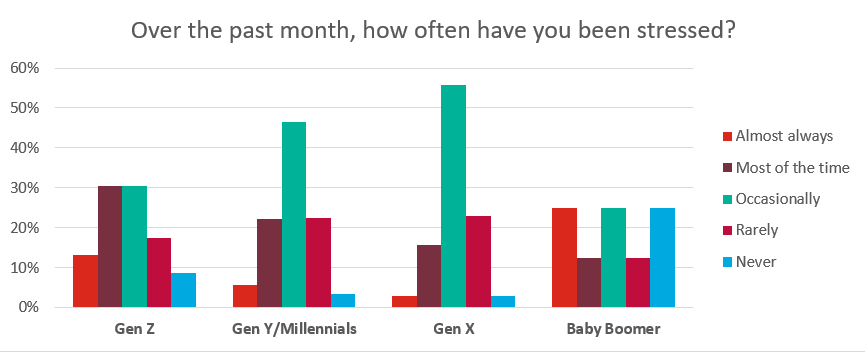Working from home leads to mental health challenges
 |
| Working from home could lead to mental health challenges, according to finding by Adecco |
It has been one and a half years since the very first COVID-19 cases were found in Vietnam and "work from home", "virtual office", and "hybrid workplace" became a norm for most businesses.
Since the fourth outbreak, many companies have work-from-home under social distancing. However, the shift to remote work as a result of social distancing procedures during the COVID-19 pandemic might cause a surprising, even if relatively mild, deterioration of mental health.
Adecco Vietnam’s latest survey reveals that more than 53.7 per cent of participants share they feel "more stressful" during the most recent outbreak compared to 2020. Looking closer, 43 per cent of Gen Z stress "most of the time" and "almost always", the highest compared to Gen Y (27.6 per cent), Gen X (18.5 per cent), and Baby Boomer (37 per cent).
The five main stressors are safety from COVID-19, long-term financial viability, job security and career prospects, mental and physical health, and too much information consumption. It is worth noting while about 80 per cent of employees attach great importance to their mental health, nearly 33 per cent of businesses do not offer any support in this aspect.
This demonstrates the inadequate attention given to mental health issues in the workplace. As observed by the regional medical director of International SOS Vietnam, most employers still prioritise overall work-related health issues, health entry assessment, and infectious disease identification and management.
 |
| Mental health is a top concern during work from home (Source: Adecco) |
Meanwhile, even before the COVID-19 outbreak, mental health was recognised as a major concern and the new “tsunami” sweeping through the modern workplace. Mental health is at the top of the list of non-communicable diseases (NCDs), also called lifestyle diseases, which affect mental well-being, productivity, and retention the most in the short term. Other NCDs following mental health problems are cardiac disease, all forms of cancer, diabetes, and respiratory diseases.
In Vietnam, employees also face barriers when discussing mental issues. The first obstacle is the widespread mental health stigma, especially in Asia, that prevents people from opening about their problems. Next, leaders have not perceived mental health first aid. Some businesses even force employees to work overtime, sometimes on weekends or holidays, to meet financial goals.
Adecco's survey shows that employees are hoping for more mental support from their employers. Allowing more flexibility and promoting a healthy work-life balance are the most popular mental supports nowadays. At the same time, employers can organise mindfulness activities or therapy sessions, provide training for the management team to identify symptoms of mental health issues as well as periodic health and wellness check-ins for employees.
According to Andree Mangels, general director of Adecco Vietnam, leaders should listen to the needs and concerns of their employees to provide timely support. This can be done through periodic surveys, one-on-one sessions, monthly town hall meetings, or anonymous feedback channels. The way leaders navigate the workforce during the pandemic can leave a mark in company culture and determine if employees stay for the long haul.
What the stars mean:
★ Poor ★ ★ Promising ★★★ Good ★★★★ Very good ★★★★★ Exceptional
 Tag:
Tag:
Themes: COVID-19
- 67 million children missed out on vaccines because of Covid: UNICEF
- Vietnam records 305 COVID-19 cases on October 30
- 671 new COVID-19 cases recorded on October 1
- Vietnam logs additional 2,287 COVID-19 cases on Sept. 21
- People’s support decisive to vaccination coverage expansion: official
Related Contents
Latest News
More News
- Congratulations from VFF Central Committee's int’l partners to 14th National Party Congress (January 25, 2026 | 09:46)
- List of newly-elected members of 14th Political Bureau announced (January 23, 2026 | 16:27)
- 14th Party Central Committee unanimously elects To Lam as General Secretary (January 23, 2026 | 16:22)
- List of members of 14th Party Central Committee announced (January 23, 2026 | 09:12)
- Highlights of fourth working day of 14th National Party Congress (January 23, 2026 | 09:06)
- Press provides timely, accurate coverage of 14th National Party Congress (January 22, 2026 | 09:49)
- Press release on second working day of 14th National Party Congress (January 22, 2026 | 09:19)
- Minister sets out key directions to promote intrinsic strength of Vietnamese culture (January 22, 2026 | 09:16)
- 14th National Party Congress: Renewed momentum for OVs to contribute to homeland (January 21, 2026 | 09:49)
- Party Congress building momentum for a new era of national growth (January 20, 2026 | 15:00)






















 Mobile Version
Mobile Version